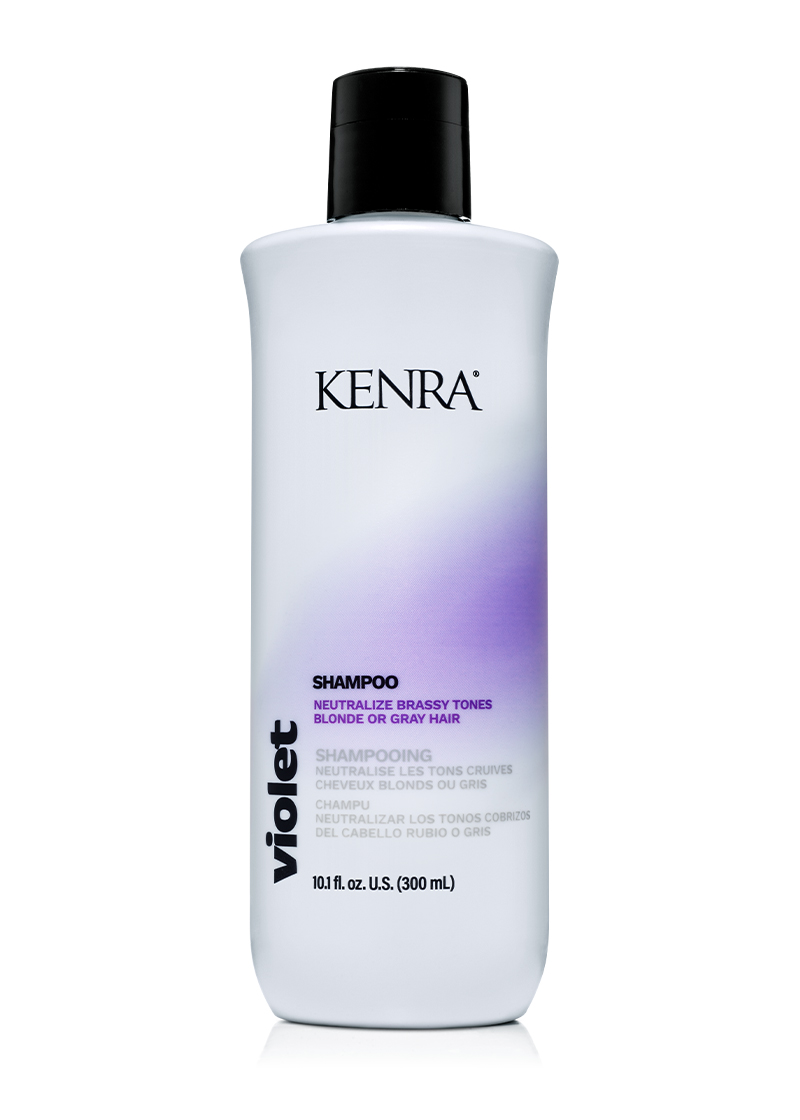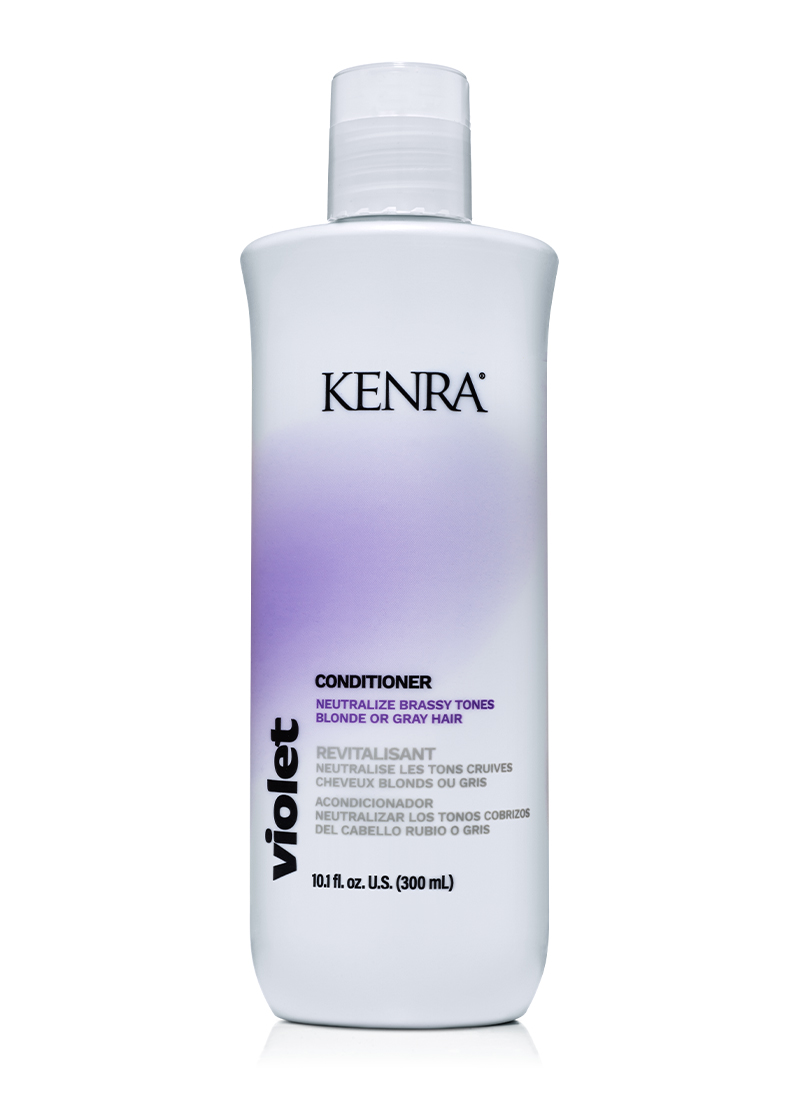The Best Ways To Tone Orange Hair Effectively

By: Kenra Professional
Uh oh! Has your hair’s color unexpectedly gone orange? This can be caused by a number of things, including swimming in the ocean or chlorine pools too often, an inadequate lift when bleaching, or a chemical build-up from too much bleaching.
But not to worry; today, we will get to the bottom of your orange tint and come up with the best plan to get your hair back to your desired color.
At Kenra Professional, we create salon-quality products for professional-level hairstylists and DIY home stylists alike. We believe that with quality hair education, you can up your game for yourself or your clients.
Of course, some things are best left to the professionals, so we will let you know when it’s time to put down the products and make a salon appointment. Trust us; you don’t want to travel too far down the path of at-home coloring.
What Happened? Why Has My Hair Turned Orange?
First things first, if your hair has suddenly turned orange after your hair coloring, do not panic! While this may seem alarming, it is actually a super common occurrence.
But why did this happen? Well, it could have happened for a couple of reasons. This new orangy tint could be the result of under lifting, over bleaching, or just a little too much summer sun.
Under Lifting
So, you started out as a brunette. Unfortunately, orange tints are super common when your hair has gone from super dark to light. If you recently transformed from a stunning brunette to a bright and bubbly blonde, then this might just be the reason that your hair turned orange.
When you go from a darker color to a lighter color, your colorist has to first bleach your hair to take out the darker pigment. This is called lifting. When your hair was lifted, it likely was not lifted enough. Your hair has to reach a certain level of lift in order to prevent orangy pigments from showing up later on after your dye begins to fade.
The reason that this tends to happen with darker natural hair colors is that a rich dark tone is made up of a lot of different colors. The most common undertone in brunette hair is copper and red. When you use bleach to lift out pigment, it leaves small amounts of the most dominant color, which is often orange.
This under-lifted phenomenon isn’t a result of bad coloring but rather a natural and unfortunate tendency of dark hair. Don’t be so quick to blame your stylist. Some hair just won’t lift enough to go bright blonde. Consult your stylist about this; the best solution for you may be to cut your losses and opt for a darker color.
Over Bleaching
If you have naturally lighter hair or have bleached your hair for a long time, your hair may be going orange for a totally different reason. This is because bleaching and dying your hair is a harsh chemical process. After a while, these chemicals can build up in the hair and cause your color to take on an orange tone.
While your most recent dye job might have looked great immediately after and even held up for several washes, you may be shocked when it goes orange. However, this is super common and nothing to worry about. Most hair dye contains three colors: blue, red, and yellow. Blue is always the first color to fade away with regular washing, leaving red and yellow, which appear orange when they are combined.
Summer Fun
Another thing that can cause your hair’s color to go orange is chlorine from pools and salt from the ocean. The chemicals present in a pool can make your hair turn a brassy orange, and so can an excess of salt in the ocean. Hey, we’re all for swimming, but if you are a regular swimmer, then you may want to reconsider your hair coloring routine.
How To Fix Orange Hair
Okay, so now you’ve probably figured out the reason that your hair has turned an orangy tone. Now it’s time to start making a plan for getting back your desired color. Sure, you can always make an appointment with your hairstylist, but there are also a few safe at-home options to try first, as well as some ways to prevent it from happening in the first place.
Tone, Tone, Tone!
Toner is one of the best ways to try and fight off orange tones. Make an appointment with your colorist, and they will certainly be able to help you. They will apply a professional grade toner to correct the color and seal it in for a few more weeks. Of course, this isn’t a permanent fix, but nothing is really permanent with hair dye.
Your colorist may use a purple toner if you are presenting with more yellow. If you are having more of an issue with a true orange, then they may use a blue toner. Again, this job is best left to the pros, so don’t try this on your own at home.
If you are looking for a more at-home-friendly option, then your best bet is to try a Violet Shampoo and Conditioner. This shampoo and conditioner are specially formulated to fight brassy orange tones while maintaining the remaining color. It’s kind of like toner shampoo. It can brighten blonde, gray, and even silver tones.
Using our Brightening Shampoo and Conditioner is great for brightening hair that has become yellow; it also works to prevent hair from turning orange in the first place. This shampoo and conditioner duo is even formulated to prevent oil build-up so that you can reduce your wash frequency to extend the life of your color further. If you are committed to rocking gorgeous blonde hair, then you should definitely use this duo from the get-go.
Next, work the brightening treatment through your hair, focusing on the roots and working the product all the way through the hair. Leave it on for three to five minutes, and then rinse thoroughly.
Kenra Professional’s Brightening Treatment can make all of the difference without salon intervention. It instantly controls brassy orange tones with the first use. It also “brightens” your blonde up to 80% and will leave your hair softer and more manageable than before.
Repeat Your Bleach
Your colorist may recommend that you go in for another bleaching session, but you will have to give your hair a rest before you can do this, or you may risk permanently damaging your hair. If you are dying your hair at home using boxed color, then do not go in for another DIY bleach. Trust us. This is a job for a color professional.
Go Darker
If you are fed up with your blonde locks or your hair just won’t lift enough to maintain a blonde tone that is not orange half the time, it may be time to consider other color options. If your colorist is urging you to ditch the blonde either for the health of your hair or because your hair is too dark to go fully blonde without compromising the integrity, then trust them.
If you go to the salon for all over bleach, there is a golden window of time in which you need to be back for touch ups, or else the lightening process becomes way more tricky, and that maintenance schedule may just not be for you.
Once your hair has had enough bleaching, you will know that it’s time to change course for a darker shade. You can always go for a lighter brown or completely flip the switch with a rich, shiny darker tone.
In Conclusion
Now you are more familiar with the cause of brassy, orange tones in hair that has been colored. The most important takeaway is that if your hair suddenly goes gold or orange, do not panic. This is super common and is totally fixable one way or another.
Sometimes, brightening shampoo and conditioner might do the trick; otherwise, you may need to kick things up a notch with a specialized treatment. If you are completely lost, make an appointment with your hairstylist, and they may suggest a professional-grade toner.
At the end of the day, orange tones are just a part of dying your hair. It doesn’t happen to everyone’s hair, but it is super common. Your colorist is a professional and will certainly be able to color correct your orange or suggest what they think the next best step is.
Sources:


